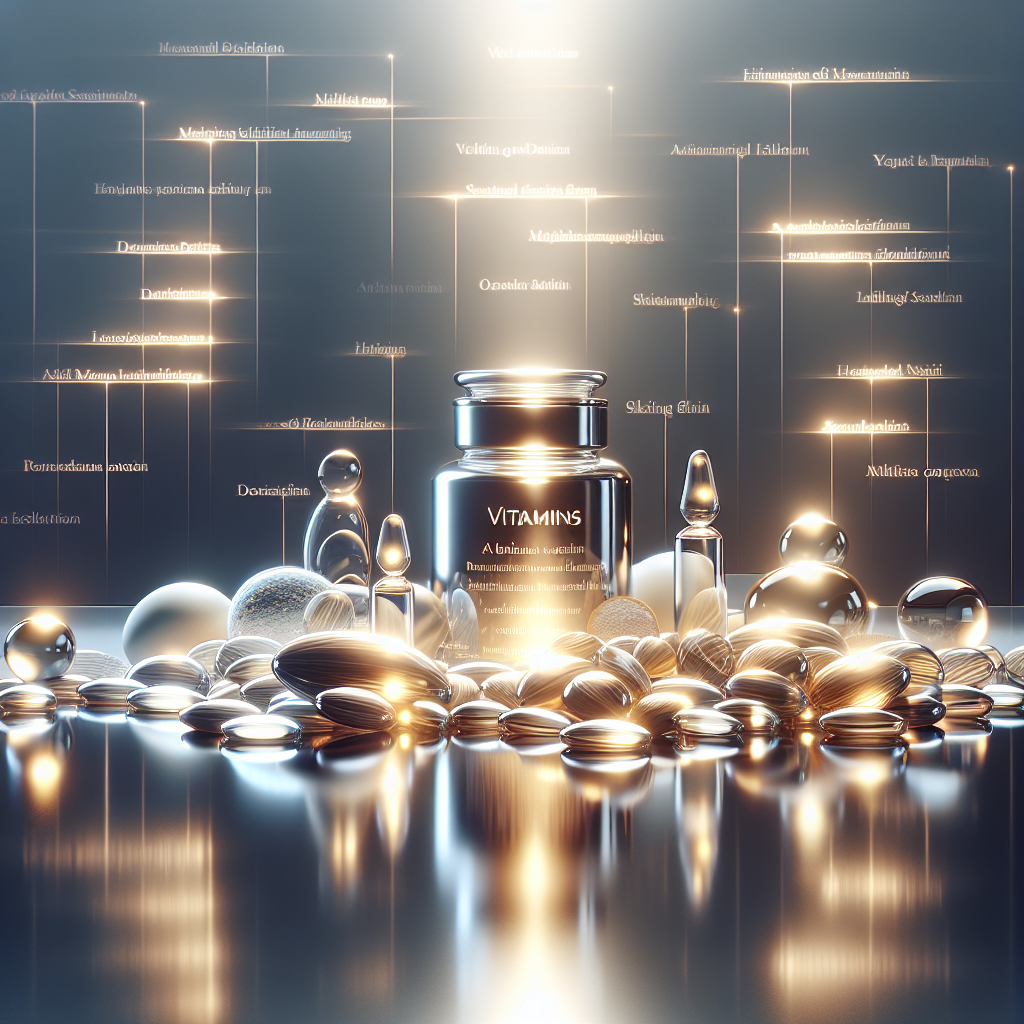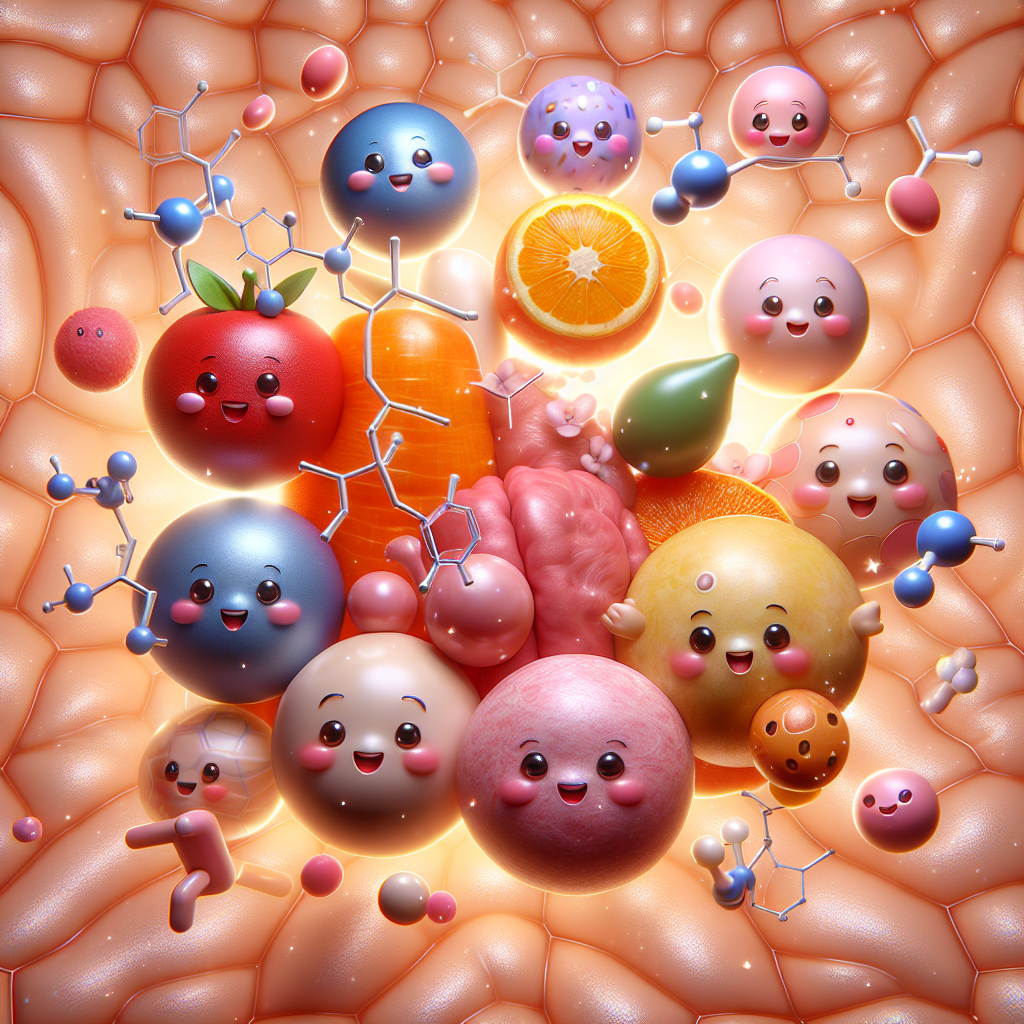Vitamins That Keep Skin Looking Youthful

Discover the secret to youthful-looking skin with our range of vitamins. Don’t wait, rejuvenate your skin today! Click here to explore our products.
Essential Vitamins for Maintaining Youthful Skin
The quest for youthful, radiant skin is a universal pursuit that transcends age, gender, and culture. While many turn to expensive creams, serums, and other topical treatments, the secret to maintaining a youthful complexion may lie in something far simpler: vitamins. Indeed, certain vitamins play a crucial role in skin health, helping to combat the signs of aging and keep skin looking fresh and vibrant.
Firstly, let’s consider Vitamin A. This essential nutrient is a powerhouse when it comes to skin health. It promotes cell turnover, which is the process by which old skin cells are replaced with new ones. This not only helps to keep the skin looking fresh and youthful, but also aids in the reduction of fine lines and wrinkles. Vitamin A can be found in foods such as sweet potatoes, carrots, and spinach, but it can also be applied topically in the form of retinol, a derivative of Vitamin A that is commonly found in anti-aging skincare products.
Next on the list is Vitamin C. Known for its antioxidant properties, Vitamin C helps to protect the skin from damage caused by free radicals, unstable molecules that can cause oxidative stress and accelerate the aging process. By neutralizing these harmful molecules, Vitamin C helps to prevent signs of aging such as wrinkles and age spots. Additionally, Vitamin C plays a key role in collagen production, a protein that gives skin its elasticity and firmness. Citrus fruits, strawberries, and bell peppers are all excellent sources of Vitamin C.
Vitamin E, another antioxidant, works in tandem with Vitamin C to protect the skin from sun damage. It absorbs harmful UV light from the sun when applied topically, which can help to prevent dark spots and wrinkles. Furthermore, Vitamin E has been shown to help keep the skin hydrated, which is crucial for maintaining a youthful appearance. Foods rich in Vitamin E include nuts and seeds, spinach, and broccoli.
Vitamin K is another essential nutrient for skin health. It is known for its ability to help with blood clotting, which can aid in the healing of wounds and bruises. Additionally, Vitamin K can help to reduce dark circles under the eyes, a common sign of aging. Green leafy vegetables like kale and spinach are good sources of Vitamin K.
Lastly, let’s not forget about Vitamin B3, also known as niacinamide. This vitamin has been shown to improve the skin’s elasticity, lighten dark spots, and reduce redness and inflammation. It can also help to strengthen the skin’s barrier function, which can help to keep the skin hydrated and protect it from environmental damage. Foods like chicken, tuna, and mushrooms are rich in Vitamin B3.
In conclusion, maintaining youthful skin is not just about what you put on your skin, but also about what you put in your body. A diet rich in vitamins A, C, E, K, and B3 can help to keep your skin looking fresh, vibrant, and youthful. However, it’s important to remember that while vitamins can play a crucial role in skin health, they are just one piece of the puzzle. A balanced diet, regular exercise, adequate sleep, and good skincare habits are all essential for maintaining a youthful complexion.
The Role of Vitamins in Skin Rejuvenation and Anti-Aging

The quest for youthful, radiant skin is a universal pursuit that transcends age, gender, and culture. While many turn to expensive creams, serums, and even surgical procedures to maintain a youthful appearance, the role of vitamins in skin rejuvenation and anti-aging is often overlooked. Vitamins, both when ingested through diet and applied topically, can play a significant role in preserving the skin’s youthful glow and delaying the onset of aging signs.
Vitamin A, also known as retinol, is one of the most potent vitamins for skin rejuvenation. It stimulates the production of new skin cells, replacing the old, damaged ones, and promotes collagen production, which is essential for skin elasticity and firmness. Retinol also aids in reducing the appearance of fine lines and wrinkles, making it a key player in anti-aging skincare. Foods rich in Vitamin A include sweet potatoes, carrots, and spinach, but it can also be found in many over-the-counter skincare products.
Transitioning to another vital vitamin, Vitamin C, it is renowned for its antioxidant properties. These antioxidants combat free radicals, unstable molecules that can cause damage to our cells, including skin cells. By neutralizing these free radicals, Vitamin C helps prevent premature skin aging and can also brighten the skin, reduce inflammation, and stimulate collagen production. Citrus fruits, strawberries, and bell peppers are excellent sources of Vitamin C, and it is also a common ingredient in many skincare products.
Vitamin E, another antioxidant powerhouse, works in tandem with Vitamin C to protect the skin from sun damage, one of the leading causes of premature skin aging. It also has moisturizing properties, helping to keep the skin hydrated and plump, reducing the appearance of fine lines and wrinkles. Foods like nuts, seeds, and leafy green vegetables are rich in Vitamin E, and it is also widely available in various skincare products.
Vitamin B3, or niacinamide, is another essential vitamin for skin health. It improves the skin’s barrier function, helping to lock in moisture and protect the skin from environmental damage. It also has anti-inflammatory properties, making it beneficial for those with acne-prone or sensitive skin. Foods like chicken, tuna, and mushrooms are rich in Vitamin B3, and it is also found in many skincare products.
Lastly, Vitamin K is known for its ability to improve blood coagulation, which can help with dark circles and bruising under the eyes. It can also aid in the healing of wounds and reduction of scars. Foods like kale, spinach, and broccoli are rich in Vitamin K, and it is also available in topical creams and serums.
In conclusion, vitamins play a crucial role in skin rejuvenation and anti-aging. Incorporating a diet rich in these vitamins and using skincare products that contain them can significantly improve the skin’s appearance and delay the signs of aging. However, it’s important to remember that while vitamins can help maintain youthful skin, they are just one piece of the puzzle. A holistic approach to skincare, including a balanced diet, regular exercise, adequate sleep, and proper hydration, is essential for maintaining healthy, youthful skin.
Unlocking the Secret to Youthful Skin: Top Vitamins You Need
Unlocking the secret to youthful skin is a quest that has been pursued by many for centuries. In the modern era, the focus has shifted from mythical elixirs to scientifically proven methods. One such method is the use of vitamins, which are essential nutrients that our bodies need to function properly. They play a crucial role in maintaining the health and vitality of our skin, helping to keep it looking youthful and radiant.
Vitamin A, also known as retinol, is one of the most important vitamins for skin health. It promotes cell turnover, which is the process by which old skin cells are replaced with new ones. This helps to keep the skin looking fresh and vibrant. Additionally, vitamin A has been shown to stimulate collagen production, which is essential for maintaining the skin’s elasticity and preventing wrinkles.
Vitamin C is another key player in the quest for youthful skin. It is a powerful antioxidant that helps to protect the skin from damage caused by free radicals, which are harmful molecules that can cause premature aging. Vitamin C also plays a crucial role in collagen synthesis, helping to keep the skin firm and supple. Moreover, it has been shown to brighten the skin and reduce the appearance of dark spots and hyperpigmentation, contributing to a more even and youthful complexion.
Vitamin E is also essential for maintaining youthful skin. Like vitamin C, it is a potent antioxidant that helps to protect the skin from free radical damage. Additionally, vitamin E has been shown to have moisturizing properties, helping to keep the skin hydrated and preventing dryness and flaking. It also has anti-inflammatory properties, which can help to soothe irritated skin and reduce redness.
Vitamin B3, also known as niacinamide, is another vitamin that can help to keep the skin looking youthful. It has been shown to improve the skin’s barrier function, helping to lock in moisture and keep out harmful substances. This can help to keep the skin hydrated and healthy, reducing the appearance of fine lines and wrinkles. Additionally, vitamin B3 has been shown to reduce the production of sebum, which can help to prevent acne and keep the skin looking clear and radiant.
Finally, vitamin K is a lesser-known vitamin that can also contribute to youthful skin. It has been shown to help with the body’s blood clotting process, which can help to reduce the appearance of dark circles under the eyes. Additionally, vitamin K has been shown to help with the healing of wounds and bruises, which can help to keep the skin looking healthy and vibrant.
In conclusion, vitamins play a crucial role in maintaining the health and vitality of our skin. Incorporating vitamins A, C, E, B3, and K into your skincare routine can help to keep your skin looking youthful and radiant. However, it’s important to remember that while vitamins can contribute to skin health, they are not a magic bullet. A balanced diet, regular exercise, adequate sleep, and proper hydration are also essential for maintaining youthful skin.